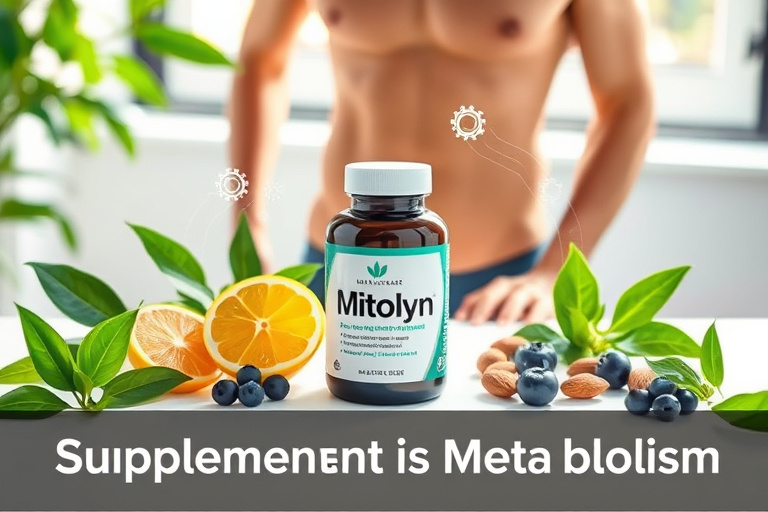If you’re exploring options to support a healthy metabolic rate, you’re not alone. The phrase supplements to help metabolism pops up frequently in fitness forums, weight-management blogs, and even wellness shops. The reality is more nuanced than a single magic pill: metabolism is a dynamic system influenced by genetics, activity, nutrition, sleep, and stress. That said, there are disciplined, science-backed ways to support metabolism, and when used as part of a broader plan, certain supplements can help you feel more energized and better equipped to burn calories efficiently.
In this guide, you’ll learn how to think about metabolism support without chasing hype. We’ll cover what boosts metabolic rate, what to look for in supplements, and how a product like Mitolyn can fit into a smarter slimming approach. We’ll also share practical, safe usage tips and point you toward credible resources for deeper dives.
How metabolism works
Metabolism is the set of chemical processes your body uses to convert the food you eat into energy. It isn’t a single number; it’s a composite of several components that determine total daily energy expenditure. The main pieces are:
- Basal metabolic rate (BMR): energy required to keep your body functioning at rest.
- Thermic effect of food (TEF): the energy needed to digest, absorb, and process nutrients from your meals.
- Physical activity: calories burned through movement, from structured workouts to daily tasks.
Because these components vary person to person, tiny changes in activity, sleep, or meal timing can shift how many calories you burn each day. That’s why some people look for supplements to help metabolism that complement a balanced diet and regular exercise—without relying on exaggerated claims or unsafe dosages.
Supplements to help metabolism: what to know before you start
Before you reach for a bottle, it helps to set expectations. Supplements can support energy, focus, and fat oxidation to an extent, but they don’t replace healthy habits. When evaluating options, consider these principles:
- Evidence base: look for ingredients with human studies showing modest improvements in energy expenditure, fat oxidation, or appetite control.
- Quality and transparency: choose products from reputable brands that disclose ingredients, dosages, and third-party testing.
- Safety and tolerability: start with a lower dose to assess tolerance, especially if caffeine-sensitive or if you’re taking other stimulants.
- Synergy with lifestyle: a well-rounded plan—balanced meals, protein adequacy, strength training, and adequate sleep—magnifies any metabolic lift from supplements.
Among the broader landscape of options, the most credible approach combines ingredients that support energy metabolism with a plan that prioritizes nutrition and movement. If you’re curious about how a metabolism-support product can fit into smarter slimming, you’ll find practical examples and guided insights in this curated discussion, including a look at Mitolyn as part of a broader plan. For more context on vitamin strategies linked to weight management, consider a deeper dive here: best vitamin to take for weight loss.
Caffeine and green tea extract
Caffeine remains one of the most studied and widely used metabolic supports. It can increase thermogenesis and fat oxidation modestly, particularly when consumed regularly with a balanced diet. Green tea extract, which often contains caffeine plus catechins like EGCG, may amplify these effects and support fat oxidation during exercise. If you’re considering supplements to help metabolism, caffeine-containing options are common, but they’re not a one-size-fits-all solution. People who are sensitive to stimulants or who take medications for anxiety or heart health should consult a clinician before increasing caffeine intake. A practical way to use these ingredients is to time them around workouts or periods of intentional activity rather than using them as a blanket energy booster for the whole day.
Capsaicin and thermogenic compounds
Capsaicin—the compound that makes chili peppers hot—has been studied for its potential to modestly raise energy expenditure after meals. When included in a sensible, fiber-rich diet, capsaicin can be part of a balanced approach to metabolic support. It’s important to note that effects are typically small and may vary between individuals. Capsaicin-containing supplements or foods can be a spicy but flavorful way to contribute to a broader plan, not a sole solution for weight management.
B-vitamins and trace minerals
B-vitamins (particularly B6 and B12) play a critical role in energy metabolism, supporting the conversion of fuel into usable energy. Iodine, iron, zinc, and magnesium also contribute to enzymatic processes that drive metabolism and energy production. Most people meet these needs through a balanced diet, but under certain circumstances—dietary restrictions, pregnancy, certain medical conditions, or increased physical demand—supplements may help fill gaps. When considering any vitamin or mineral supplement, avoid megadoses and seek guidance if you have kidney issues, thyroid concerns, or a history of mineral imbalances.
Amino acids and protein
Protein and certain amino acids support muscle maintenance and repair, which in turn helps preserve resting energy expenditure. Adequate protein intake is foundational for metabolism, particularly during weight management. Some athletes and active individuals use targeted amino acids or high-quality protein supplements to ensure they’re hitting daily targets. A steady protein intake paired with resistance training is a powerful driver of favorable body composition changes and a healthy metabolic pace.
Gut health and fiber
Emerging evidence links gut health to metabolic efficiency. A diet rich in fiber and with a diverse microbiome can influence satiety, digestion, and energy balance. Some supplements marketed for metabolism focus on gut-friendly fibers or probiotics. While the science is evolving, a fiber-forward approach—via whole foods and, if needed, a gentle supplement—can support the overall system without overstimulation.
Spotlight on Mitolyn: what to know
Mitolyn has become a notable name in the space of metabolism-support supplements. While individual results vary, Mitolyn is often discussed as part of a smart approach to weight management that emphasizes energy, focus, and a feeling of metabolic balance. If you’re evaluating products for your regimen, consider how Mitolyn fits with your dietary pattern, exercise plan, and sleep routine. Like any supplement, it’s most effective when used consistently as part of a comprehensive strategy rather than as a stand-alone solution.
For readers seeking a deeper look into Mitolyn’s vitamin and weight-management connections, this resource provides practical guidance on choosing vitamins for smarter slimming: best vitamin to take for weight loss.
In addition, if you want to explore a broader, smarter approach to shedding pounds that includes evidence-based options like Mitolyn, you can read about the best over-the-counter diet pills and a smarter approach here: best over-the-counter diet pills for weight loss.
When you’re ready to explore the official option, you can access the Mitolyn product page through the affiliate link below. This link connects to a ClickBank listing that ships to many regions and is provided for convenient access to the product described in this guide: Mitolyn on ClickBank.
Safe usage and dosage considerations
Safety first is the best rule of thumb when adding any supplement to your routine. Start with the recommended serving on the label and assess tolerance for 1–2 weeks. If you have underlying health conditions, are pregnant or nursing, or take medications (especially stimulants, thyroid medicines, or anticoagulants), consult your healthcare provider before starting any new supplement regimen. Pairing supplements with adequate protein intake, regular resistance training, and consistent sleep patterns can improve outcomes and reduce the risk of unwanted side effects.
Remember that supplements to help metabolism are not magic bullets. They work best when combined with a nutrient-dense diet, balanced energy intake, and an activity plan that includes both cardio and strength training. If you’re unsure where to begin, a registered dietitian or qualified fitness professional can help tailor a plan to your goals and medical history.
Myths vs. realities about metabolism supplements
Several myths persist about metabolism-support supplements. Here are a few common misconceptions, followed by science-backed clarity:
- Myth: A single pill dramatically increases daily calorie burn. Reality: Most products offer modest benefits at best; big changes come from lifestyle changes and consistent routines.
- Myth: All caffeine-based products are safe for everyone. Reality: Tolerance and health conditions vary; starting slowly and respecting caffeine limits is prudent.
- Myth: If it’s natural, it’s risk-free. Reality: Natural ingredients can cause interactions or adverse effects in some people; never exceed recommended doses.
If you’re evaluating options, look for transparency, third-party testing, and a realistic set of expectations. A holistic approach—combining evidence-based supplements with nutrition and activity—tends to deliver the most sustainable results over time.
Pairing supplements with diet and exercise for best results
Supplements to help metabolism work best when they’re part of a cohesive plan. Prioritize protein at every meal to support lean mass, practice a mix of strength training and cardio, and ensure you’re hitting a daily fiber and micronutrient target. Small, consistent changes compound over weeks and months, often producing meaningful shifts in energy, appetite regulation, and body composition.
In practical terms, you might structure a week like this: schedule 3–4 resistance-training sessions, include two to three cardio sessions, and distribute protein across 3–5 meals daily. Layer in a metabolism-focused supplement where appropriate, making sure it complements your dietary pattern rather than overpowering it. If you’re curious about how Mitolyn can fit into this structure, review the official product information and consumer guidance through the resources linked above and consider trying it with your clinician’s blessing.
Conclusion
When considering supplements to help metabolism, the goal should be to support your body’s energy balance in harmony with a healthy lifestyle. Ingredients like caffeine, green tea extracts, capsaicin, B-vitamins, and protein-focused strategies can contribute to modest improvements in energy and fat utilization, but they are most effective when paired with a robust nutrition plan, regular physical activity, and adequate sleep. Mitolyn, as part of a well-rounded program, may offer additional support for those aiming to optimize their metabolic pace. Always prioritize safety, start with conservative doses, and consult professionals if you have health concerns.
For readers eager to explore vitamin-driven strategies alongside Mitolyn, the practical guide on a smarter slimming approach is a helpful resource. You can read more here: best vitamin to take for weight loss. And for a broader perspective on over-the-counter options and smart strategies, check out this companion article: best over-the-counter diet pills for weight loss.
If you’re ready to explore the Mitolyn option directly, you can visit the official listing here: Mitolyn on ClickBank.




